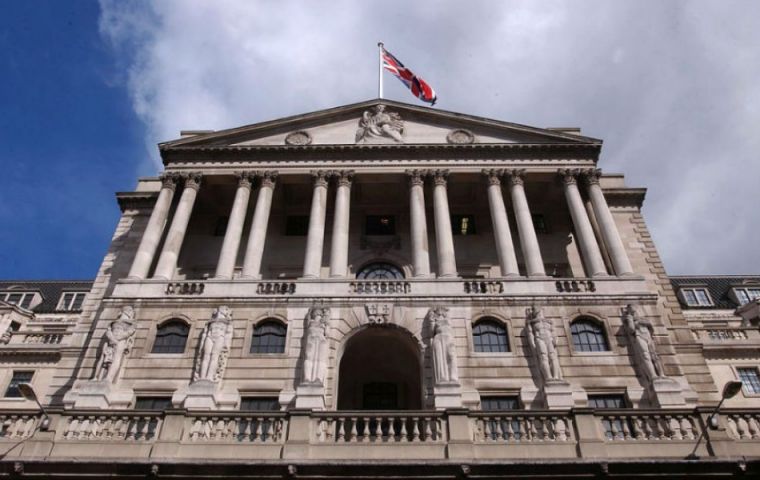MercoPress. South Atlantic News Agency
Bank of England expects pace of interest rate increases to accelerate
 Bank of England said rates would need to rise “earlier” and by a “somewhat greater extent” than they thought at their last review in November.
Bank of England said rates would need to rise “earlier” and by a “somewhat greater extent” than they thought at their last review in November. The Bank of England has indicated that the pace of interest rate increases could accelerate if the economy remains on its current track. Bank policymakers voted unanimously to keep interest rates on hold at 0.5% at their latest meeting. However, they said rates would need to rise “earlier” and by a “somewhat greater extent” than they thought at their last review in November. Economists think the next rate rise could come as soon as May.
The value of the pound jumped by about 1% against both the dollar and the euro in reaction to the Bank's comments. Higher interest rates have an important effect on households and the economy.
Around 8.1 million UK households have a mortgage, and of those almost half are on either a standard variable rate or a tracker rate. Interest rates on those types of mortgages would be likely to match any increase in official rates made by the Bank of England.
But for savers a move higher by the Bank of England could be a bonus, as High Street banks generally have to raise their rates of interest. In November, the Bank raised the cost of borrowing for the first time in more than 10 years - from 0.25% to 0.5%.
Its forecasts at the time indicated there could be two more increases of 0.25% over three years. But it now appears there could be a third increase and those rises could be sooner than expected.
“The Committee judges that… monetary policy would need to be tightened somewhat earlier and by a somewhat greater extent over the forecast period than anticipated at the time of the November report,” minutes from the Monetary Policy Committee's (MPC) meeting said.
The Bank noted that the global economy was expanding at the fastest pace in seven years and that the UK was benefiting from that growth. It also thinks that UK wage growth will start to pick up, giving the economy a further boost.
As a result, the Bank has raised its growth forecast for the UK economy to 1.7% this year, from its previous forecast of 1.5% made in November. But it says its forecasts are based on a “smooth” adjustment to Britain's departure from the European Union.
Economists think it is likely that the next rate rise will come in May, but are not certain.
Paul Hollingsworth, senior UK economist at Capital Economics said: “Today's releases pave the way for an interest rate hike in May, and we think that the MPC will hike a further two times this year, taking Bank Rate to 1.25%.”
Official figures last month showed that the UK economy grew 0.5% in the last three months of 2017, which was faster than economists had been expecting. Unemployment remains low at 4.3% and inflation edged lower in December to 3%.
The Bank also released the letter sent by governor Mark Carney to the Chancellor of the Exchequer, Philip Hammond, to explain why inflation had breached the target rate of 3% in November.
In the letter, Mr Carney said that higher inflation was “almost entirely” due to the effects of a rise in the prices of imports, caused by the fall in the pound's value after Britain voted to leave the European Union.
The chancellor replied by stressing the importance of boosting UK productivity and the government's efforts to make that happen.




Top Comments
Disclaimer & comment rules-

Read all commentsThe question is why is this piece appearing in Mercopenguin, a British government propaganda organ supposedly devoted to America, South America and the “South Atlantic”?
Feb 14th, 2018 - 05:43 am 0Commenting for this story is now closed.
If you have a Facebook account, become a fan and comment on our Facebook Page!